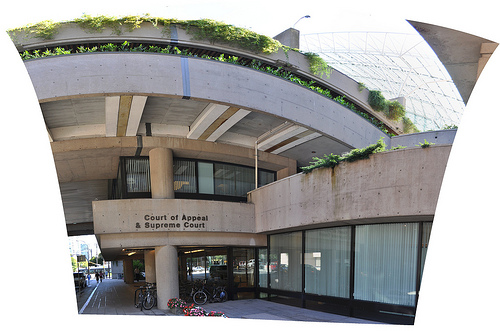By Jennifer Colbourne (The Cascade) – Email
Print Edition: July 4, 2012
We all plan to die the same way, with our family and friends gathered around our bed, gently falling asleep at the age of 93, peaceful and fulfilled. There is no pain, no struggle, not even sadness – we are ready to go.
Nobody likes the reality that one out of four of us will actually die of cancer, the leading cause of death in BC. Next top causes are heart disease, strokes, chronic lower respiratory diseases and accidents. So basically, unless you instantly die in a car crash (lucky you), there’s a very, very good chance that you’re going to die in pain. It won’t necessarily be quick pain; there are a whole range of diseases that prolong death and suffering while you slowly waste away.
I think we can all agree that dying in pain is a truly terrible thing, and the reality is that even the strongest painkillers can only help so much – not to mention the side effects and agonizing psychological confusion often caused by such heavy drugs. This is why, when Fido is in great pain and beyond saving, we “humanely” put Fido to sleep, rather than watching him die in excruciating pain and a drug haze.
Yet it’s inhumane to help a human escape such agony and indignity?
Traditionally, the frustratingly contradictory answer would be yes. However, the BC Supreme Court has now ruled that the law against physician-assisted suicide is unconstitutional.
This comes after five plaintiffs brought the issue to court, the most notable of these being Gloria Taylor, a woman with ALS, better known as Lou Gehrig’s disease. This horrifying disease involves having your entire body completely degenerate with severe difficulties in moving, swallowing, eating, breathing and other essential functions. Often, though, fully functional, intelligent minds are still trapped in these almost completely paralyzed, shutting-down bodies. The agony, both physically and psychologically, is unthinkable.
I don’t think many of us relish the idea of being conscious while our body is slowly tortured beyond relief. Most of us, like Gloria Tayor, would much rather end it right away. Yet when you’re in the final stages of an incapacitating disease, obviously you don’t have the ability to quickly end it all.
The plaintiff’s argument is that it’s discrimination that a physically disabled person cannot be helped to kill themselves. They are being denied the basic right that healthy people have to take their own lives (suicide being legal in Canada).
This is different than euthanasia. With physician-assisted suicide, the patient presses the button or pushes down the needle that actually ends their life. The distinction is a big one, because it signifies that the decision isn’t being made for them, and worries that rogue doctors are going to put our unwilling grandparents to sleep like pound animals can be put to rest.
Obviously such measures would have to be regulated, as they have in other countries and states where they’ve been legalized. It goes without saying that we have to ensure that the patient is critically ill with no hope of recovery and has made the decision in their right mind. For example, both the Netherlands and Belgium require the involvement of two doctors, and, in Belgium, a psychologist is required if the patient’s competency is uncertain as well.
Physician-assisted suicide doesn’t devalue human life – it embraces humanity and the individual’s well-being. The right to the mercy of a dignified, painless death is an essential one, and thankfully Canada has finally recognized that. You may very well thank the Supreme Court yourself one day on your death bed, when, surrounded by your friends and family, you simply press a button and fall gently to sleep.


